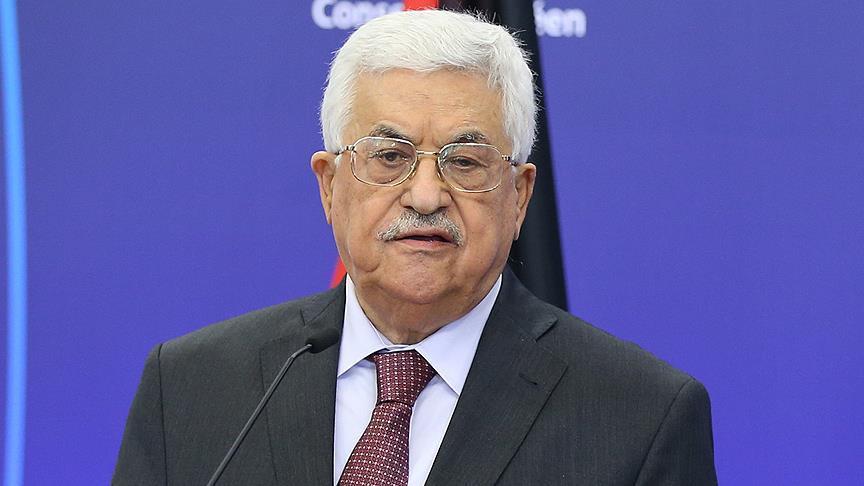Israeli PM rejects ‘2-state solution’: Palestine leader
Palestinian President Mahmoud Abbas speaks to Anadolu Agency about the dim prospects for peace with Benjamin Netanyahu’s Israel

By Abdel-Raouf Arnaout
NEW YORK
Palestinian President Mahmoud Abbas has reiterated the difficulties involved with reaching a peace deal with Israel under Prime Minister Benjamin Netanyahu, saying the latter continued to reject the Palestinians’ longstanding demand for a "two-state solution based on 1967 borders".
In an exclusive interview with Anadolu Agency, Abbas accused Netanyahu of seeking to normalize relations with Arab countries without withdrawing from Palestinian land occupied by Israel in 1967, in line with the terms of a 2002 Saudi-proposed peace initiative.
Abbas also urged the U.K. to take responsibility for the role it played in the creation of a "Jewish homeland" in Palestine through the 1917 "Balfour Declaration".
"We have raised this issue at the UN and will continue to raise it at all [international] forums," Abbas told Anadolu Agency on the sidelines of the 71st UN General Assembly, which just wrapped up in New York.
Peace ‘difficult’
Asked if it was possible for Palestinian negotiators to hammer out a peace deal with a Netanyahu-led government, Abbas said: "Based on our experience, it's difficult to reach a solution with him."
Abbas added: "The Israeli PM has so far refused to use the phrase ‘two-state solution based on 1967 borders’, even though this [formula] has the support of the rest of the world and is referred to in several UN General Assembly resolutions".
"How can we reach an understanding in principle when there is no agreement on this issue?" the Palestinian president asked.
He went on to assert that Netanyahu had recently "evaded" a Russian proposal to host the two men for direct talks in Moscow.
"Russian President Vladimir Putin's envoy asked us [i.e., the Palestinian leadership] regarding the possibility of a meeting with Netanyahu," Abbas said. "I said that I didn’t mind, and they [the Russians] conveyed my readiness to Netanyahu."
"But Netanyahu sent a delegation to Moscow, members of which claimed that we had not agreed to the meeting," he added. "The Russians replied by saying that I was ready to meet in Moscow on Sept. 8."
"Israeli officials, however, then asked the Russians to postpone the meeting, for which they have yet to set a new date," Abbas said.
No concessions
Abbas also criticized Israeli efforts to normalize relations with Arab states without offering anything in return.
"The Israelis refuse to accept the terms set out in the Arab Peace Initiative," he said.
First tabled by Saudi Arabia at a 2002 Arab Summit in Beirut, the Arab Peace Initiative offers full recognition of Israel by all Arab states in return for a full Israeli withdrawal from all Arab territories occupied in 1967 and the establishment of a Palestinian state with East Jerusalem as its capital.
It also calls for a "just solution" to the problem of Palestinian refugees based on UN General Assembly Resolution 194 of 1948.
"The Israelis should have taken advantage of this opportunity," Abbas told Anadolu Agency.
"After a full Israeli withdrawal from occupied Arab land and a just solution to the refugee issue," he said, "Arab countries were ready to establish diplomatic relations with Israel in line with the initiative’s terms."
He added: "But the Israelis want to normalize relations without countenancing any notion of withdrawal."
French peace efforts
Abbas also expressed hope for a successful outcome to recent French efforts to hold an international Mideast peace conference before year’s end.
"We have already agreed with French President François Hollande to hold the conference," he said.
"In early June," Abbas recalled, "Paris hosted a preparatory meeting -- attended by representatives from 28 countries -- at which it was agreed to convene an international conference [devoted to solving the Middle East dispute] before the end of the year."
"French efforts are still ongoing in this regard," he added. "We hope the event will materialize later this year, but we fear the U.S. may hinder its success."
As it currently stands, no date has yet been set for the conference.
Balfour lawsuit
As for his stated intention to file a lawsuit against the British government for issuing the "Balfour Declaration", Abbas said: "When you look back at Palestinian history, you will see how much injustice we’ve suffered as a result of this promise."
"We believe it’s now time to raise this issue," he added.
In 1917, the British government issued the "Balfour Declaration", named after Britain’s then-Foreign Secretary Arthur James Balfour.
Addressed to Walter Rothschild, a leader of Britain’s Jewish community at the time, the declaration called for the establishment in Palestine of a "national home for the Jewish people".
In this regard, Abbas said, "We say to the British: you have committed a crime against our rights; you promised our land to other people when you did not have any authority to do so."
"Britain must shoulder its responsibilities," he added. "We will not be silent on this issue; we’ve raised it at the UN and we will continue to raise it in other international forums."
Settlements
Abbas went on to stress the illegality of ongoing Israeli settlement-building on occupied Palestinian land.
"There are more than 12 UN Security Council resolutions calling on Israel to halt settlement-construction and describing such activity as illegitimate," he said. "Nevertheless, Israel has continued its policy of unabated settlement building."
Israel’s ongoing construction of Jewish-only settlements in the occupied West Bank -- along with its refusal to release Palestinian political prisoners -- was a main reason for the collapse of Israeli-Palestinian peace talks in April 2014.
As for the current state of Palestinian-Turkish relations, Abbas said: "Relations are good; there are no problems between us and Turkey. And we certainly don’t interfere in Turkey's internal affairs."
Anadolu Agency website contains only a portion of the news stories offered to subscribers in the AA News Broadcasting System (HAS), and in summarized form. Please contact us for subscription options.

